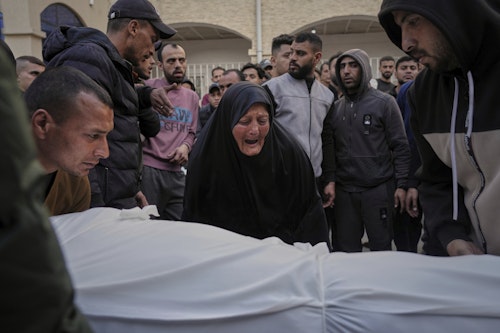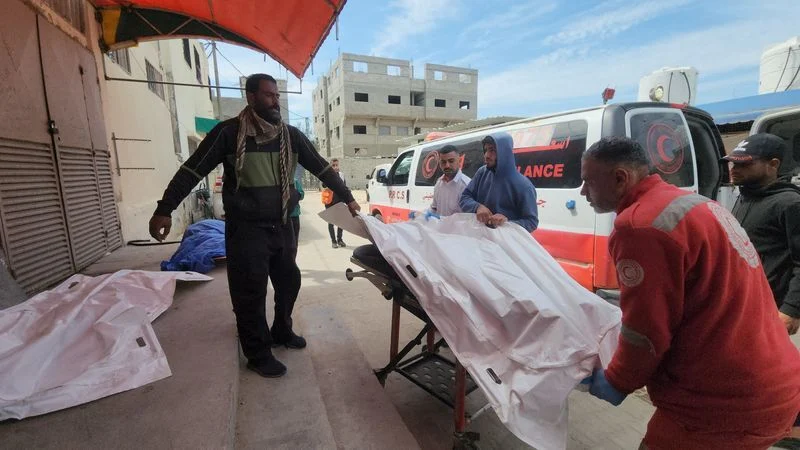Israeli airstrikes in Gaza killed more than 400 people, Palestinian health officials said Tuesday, in a major escalation threatening the collapse of a two-month ceasefire. Israel vowed intensified military action to secure the release of hostages held by Hamas.

The Palestinian militant group Hamas, which still holds 59 of the roughly 250 hostages taken during its October 7, 2023 attack on Israel, accused Israel of violating the Gaza ceasefire agreement and undermining mediation efforts for a permanent truce.
Israeli Prime Minister Benjamin Netanyahu said he had instructed the military to take “strong action” against Hamas due to its refusal to release the remaining Israeli hostages and rejection of truce proposals.
Egypt, a key mediator, urged restraint and called on all parties to work toward a lasting Gaza peace deal.
Israeli airstrikes on Gaza hit residential areas and tent encampments across the enclave, while Israeli tanks shelled locations along Gaza’s eastern and southern borders, according to Palestinian sources.
“It was a night of hell. It felt like the first days of the war,” said Rabiha Jamal, 65, a mother of five from Gaza City.
“We were preparing to eat before fasting when the building shook and explosions began. We thought it was over, but war is back,” she told Reuters via chat.
Hospitals, already overwhelmed by months of bombardment in Gaza, received an influx of casualties. Bodies wrapped in white plastic sheets stained with blood were stacked as Gaza’s Hamas-run health ministry reported 404 killed and 562 injured, including many children.
The Israeli military said it had targeted Hamas strongholds and that operations would continue as necessary, raising concerns that Israeli ground forces might return to combat.

The United Nations human rights chief, Volker Turk, condemned the bombardment, warning of worsening conditions in Gaza’s humanitarian crisis.
“This will add tragedy onto tragedy,” Turk said. “Israel’s resort to yet more military force will only increase Palestinian suffering.”
Israel has blocked humanitarian aid to Gaza for over two weeks, worsening the crisis. Meanwhile, Israeli media reported that shelters were being prepared in Tel Aviv in anticipation of Hamas rocket attacks or retaliation from Yemen-based militants.
The strikes were the deadliest since the Gaza ceasefire agreement in January, marking a sharp escalation compared to recent targeted Israeli drone strikes.
Eyewitnesses in Gaza said Israeli tanks shelled Rafah, forcing many families who had returned after the truce to flee again toward Khan Younis.
Among the dead was Mohammad Al-Jmasi, a senior Hamas political leader, along with his family members, including his grandchildren, who were inside their Gaza City home when an airstrike hit. At least five senior Hamas officials were killed.
In Washington, a White House spokesperson confirmed that Israel had consulted with the Biden administration before launching the airstrikes.
“Hamas could have released hostages to extend the ceasefire but instead chose refusal and war,” said White House spokesperson Brian Hughes.
The Kremlin voiced concern over reports of “major civilian casualties” and urged both sides to show restraint.
Negotiations had been ongoing in Doha, with mediators from Egypt and Qatar seeking to extend the Gaza ceasefire. The previous truce led to the release of 33 Israeli hostages and five Thai nationals in exchange for around 2,000 Palestinian prisoners.
Israel, backed by the United States, pushed for the return of the remaining hostages in exchange for an extended truce, aiming to halt fighting until after Ramadan and Passover in April.
However, Hamas has insisted on talks for a permanent ceasefire and a full Israeli military withdrawal from Gaza, in line with the original truce terms.
Hamas spokesperson Abdel-Latif Al-Qanoua told Reuters that discussions with mediators were ongoing and that the group remained committed to implementing the original ceasefire deal.
Since October 7, 2023, when Hamas-led gunmen attacked Israeli border communities, killing 1,200 people and taking 251 hostages, Israel’s military response has devastated Gaza’s infrastructure.
Palestinian health authorities report that more than 48,000 people have been killed in Gaza, with vast sections of the enclave’s housing, hospitals, and infrastructure destroyed.


